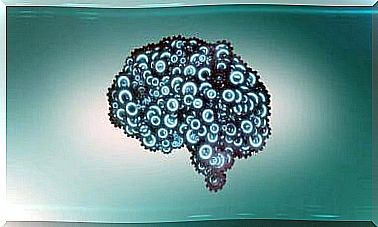Anxiety Diarrhea: Why Does It Occur?

It is not a trivial topic. Anxiety diarrhea is annoying and even troublesome. There are many people who, at the least opportune moment, are forced to interrupt what they are doing to go to the bathroom. Something like this can be disabling, but the truth is that this intestinal alteration is usually accompanied by other associated symptoms.
Stomach pain, tremors, dizziness, palpitations … Anxiety disorders show multiple clinical signs as extensive as they are complex, in which intestinal disorders are a constant. This is a condition that appears in adults and is especially common in children. It is true, yes, that first of all it is convenient to rule out other associated diseases.
However, our emotions, accumulated stress and anxiety that removes everything and that over-activates us have their favorite focus on the stomach and intestines. We have all heard about this brain-gut axis and its link to more than one psychological problem. We analyze it below.

Diarrhea from anxiety: what is the cause?
In the pharmaceutical industry, treatments for both diarrhea and constipation offer millions of dollars every year. Intestinal disorders are one of the most common health problems. And as we well know, the causes can be multiple.
However, diarrhea due to anxiety usually has its own distinctive characteristics that differentiate it from other intestinal disorders.
They tend to be more punctual in time. It is very common, for example, that a few days before an exam or any other situation that one qualifies as stressful, that intestinal decomposition is experienced. In addition, diarrhea due to stress or anxiety does not come alone, but is accompanied by other physical and psychological discomforts (increased worry, nervousness, insomnia, etc.).
Let us now know the associated causes.
Physiological changes oriented to face a supposed “threat”
Anxiety responds to an instinctive mechanism that prepares us to react to an event, stimulus or circumstance that the brain processes as threatening. That worry, that restlessness in our mind is translated into a hormonal response: cortisol, adrenaline, dopamine are released … The objective is to activate the body to act.
This causes the brain to suddenly stop prioritizing the digestive system. The muscles that will allow us to fight or escape are important. And for this reason, what it does is reduce blood flow to the stomach and intestines to prioritize it in the arms, legs. ..
These digestive disorders translate into cramps, stomach pain and also diarrhea. Likewise, the evacuation of feces and urine helps the body to be lighter and ready to act in the face of this “supposed threat”.
Anxiety, diarrhea and irritable bowel syndrome
Diarrhea due to anxiety can be experienced in a specific way (the most common), but it can also arise as a problem that goes beyond two months and that becomes a constant. In this way, we could find another type of chronic reality associated with irritable bowel.
It is very common for patients with a diagnosis of anxiety disorder or depression to show irritable bowel syndrome.
Thus, research works such as those carried out at the University of Xingtai (China), indicate something remarkable. This condition appears mainly in women and, beyond the association with psychological problems mentioned above, there is no morphological change in the intestines or biochemical abnormalities that explain this problem.
Another study published in The Lancet offers interesting data. The anxiety diarrhea associated with irritable bowel syndrome could be explained by a dysfunction between the communication between the brain and the intestine. The anxiety itself can make the first understand that there is a problem in the digestive system and that one way to act in the face of this anomaly is to evacuate the intestine (diarrhea).
However, it is important to know how to differentiate common and specific anxiety diarrhea from that associated with irritable bowel. We analyze it.
Irritable bowel symptoms (chronic condition) other than anxiety diarrhea
- In irritable bowel syndrome, the person suffers from periods of diarrhea and also constipation.
- Pain and cramps in the abdomen that can last for days or weeks.
- Intestinal gases appear.
- Tiredness.
- Swelling.
- Pain and intestinal disorders are intensified when eating potentially inflammatory foods such as wine, coffee, chocolate, dairy, etc.

How to deal with this problem?
Anxiety diarrhea can be very disabling. It is especially so when the person suffers from the aforementioned alteration: irritable bowel syndrome.
The most important thing in all cases is to consult with the doctor and receive a good diagnosis to rule out other associated diseases.
On the other hand, when it comes to the symptoms associated with anxiety, it is always appropriate to take into account some tips.
What can I do if I usually have digestive and intestinal disorders associated with anxiety?
Anxiety is managed by coping with everyday stress. Having control of our emotions before they dominate us means having more than one coping tool at hand.
Here are some examples:
- Let’s learn to rationalize fears.
- Let’s have a compassionate and non-threatening self-talk. Let’s not make a mountain out of a molehill, let’s focus on the present without anticipating risks that do not yet exist.
- Let’s learn to act in the face of what worries us and not just to react to what happens to us.
- Let us accept that we cannot have everything under control. Uncertainty is part of life.
- Let’s learn to rest, to offer ourselves moments of enjoyment.
- Techniques such as deep breathing or meditation can help us.
- Let’s avoid inflammatory foods like coffee, dairy, alcohol …
- Mint, anise or sage infusions are very suitable for our intestines.
Although stress diarrhea is always annoying, it is still a symptom of a psychological reality that we can and must deal with. Let’s keep it in mind.









